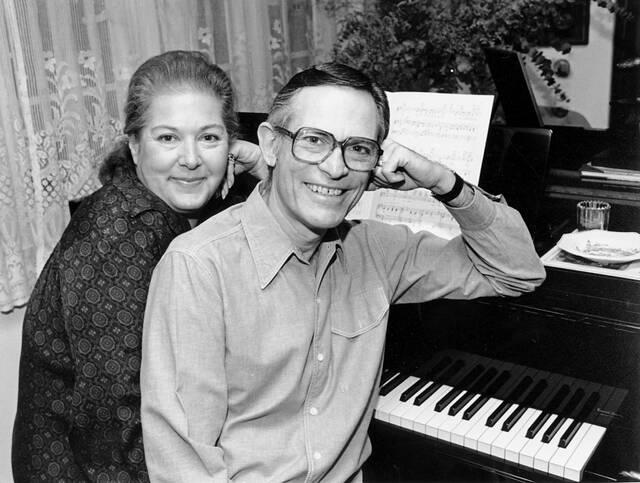Remembering Alan Bergman: A Legendary Lyricist’s Lasting Impact on Film Music
Alan Bergman, the celebrated Oscar-winning lyricist best known for co-creating the iconic song The Way We Were, has passed away at the age of 99. Revered for his poetic and emotionally rich lyrics,Bergman’s work shaped the soundscape of Hollywood’s golden era,leaving an enduring imprint on cinematic music. His death signifies the closing chapter of a generation of songwriters whose artistry defined classic film soundtracks and continues to inspire contemporary artists.
The Timeless Influence of Alan Bergman on Hollywood’s Musical Landscape
Alan Bergman’s contributions to film music are monumental and continue to resonate decades after their creation. As a masterful lyricist, he infused songs with profound emotional depth, enhancing the storytelling power of cinema. Alongside his wife and creative partner Marilyn Bergman, he penned lyrics that have become staples in American film history. Their collaborations with renowned composers produced unforgettable melodies that evoke worldwide themes of love, memory, and hope.
Key aspects of Bergman’s enduring legacy include:
- Masterful narrative songwriting: His lyrics seamlessly wove poetic imagery with accessible storytelling, perfectly complementing film narratives.
- Dynamic creative partnerships: Collaborations with composers such as Michel Legrand and Dave Grusin resulted in a unique fusion of words and music that elevated cinematic scores.
- Evergreen classics: Songs like The Way We Were and What Are You Doing the Rest of Your Life? remain beloved across generations, embodying timeless emotional truths.
| Song | Film | Release Year | Accolades |
|---|---|---|---|
| The Way We Were | The Way We Were | 1973 | Academy Award for Best Original Song |
| What Are You Doing the Rest of Your Life? | The Happy Ending | 1969 | Oscar Nomination |
| How Do You Keep the Music Playing? | Best Friends | 1982 | Golden Globe Nomination |
The Story Behind The Way We Were: Crafting a Cultural Anthem
The Way We Were stands as a poignant emblem of nostalgia and emotional reflection, born from the creative partnership of Alan and Marilyn Bergman with composer Marvin Hamlisch. The song’s lyrics, rich with bittersweet reminiscence, were inspired by the Bergmans’ own experiences with youthful love and the passage of time. This heartfelt narrative struck a universal chord, transforming the song into an enduring anthem about cherishing memories that can never be relived.
The creation of this classic involved a deeply collaborative and introspective process:
- Drawing from personal history: The Bergmans infused the lyrics with reflections on lost innocence and past relationships.
- Musical partnership: Marvin Hamlisch’s evocative composition perfectly matched the emotional tone of the words.
- Film integration: The lyrics were carefully tailored to echo the movie’s themes of love, political idealism, and memory.
| Year | Award | Importance |
|---|---|---|
| 1974 | Academy Award for Best Original Song | Honored for outstanding lyrical contribution to film |
| 1974 | Grammy Award | Best Song Written for a Motion Picture |
Iconic Collaborations That Shaped Film Songwriting History
Alan Bergman’s creative alliances, especially with his wife Marilyn and composer Marvin Hamlisch, were instrumental in producing some of the most memorable film songs of the 20th century. Their combined talents created a distinctive blend of evocative lyrics and sweeping musical arrangements that captured the emotional core of cinematic storytelling. These collaborations not only defined an era but also elevated songwriting to an art form that resonates beyond the screen.
Highlights of these partnerships include:
- Alan & Marilyn Bergman: Known for their introspective and heartfelt lyrics, they crafted songs that spoke to the human experience across generations.
- Marvin Hamlisch: A gifted composer whose melodies perfectly complemented the Bergmans’ words, creating timeless cinematic moments.
| Song | Film | Awards & Nominations |
|---|---|---|
| The Way We Were | The Way We Were (1973) | Academy Award for Best Original Song |
| What Are You Doing the Rest of Your Life? | Flying Away (1969) | Oscar Nomination |
| On Golden Pond | On Golden Pond (1981) | Academy Award Nomination |
Lessons from Alan Bergman: Guidance for Emerging Lyricists
Alan Bergman’s body of work offers invaluable insights for aspiring songwriters aiming to craft lyrics that resonate deeply. His beliefs emphasized emotional sincerity and storytelling clarity, demonstrating that the most impactful lyrics are those that connect on a universal level. Bergman’s meticulous attention to language and his collaborative spirit serve as a blueprint for creating songs that endure.
Key takeaways for lyricists inspired by Bergman’s approach include:
- Embrace collaboration: Working closely with composers can transform lyrics into a richer, more dynamic musical experience.
- Convey nuanced emotions: Use metaphor and imagery to evoke feelings subtly, allowing listeners to find their own interpretations.
- Commit to revision: Refine every line carefully; Bergman’s lyrics were the result of thoughtful and repeated edits.
- Draw from authentic experiences: Genuine life stories and observations create the most relatable and powerful songs.
| Advice | Bergman Example |
|---|---|
| Emotional Authenticity | The Way We Were evokes nostalgia and heartfelt memories |
| Collaborative Creativity | Partnerships with composers like Michel Legrand and Marvin Hamlisch |
| Attention to Detail | Careful word selection balancing lyricism and clarity |
| Timeless Storytelling | Lyrics that continue to resonate across decades |
Final Reflections: Celebrating a Legendary Songwriter’s Enduring Impact
The passing of Alan Bergman closes a remarkable chapter in the history of American songwriting. His extensive career, marked by a collection of songs that have become cultural touchstones, continues to influence musicians and audiences alike. As the world honors his memory, Bergman’s work stands as a powerful reminder of the art of lyrical storytelling and its ability to capture the complexities of the human heart.
